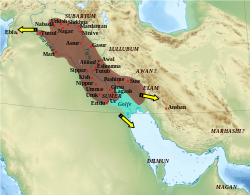
Back Аккад Abkhazian Akkadiese Ryk Afrikaans الإمبراطورية الأكدية Arabic الامبراطوريه الاكديه ARZ Imperiu acadiu AST Akkad Azerbaijani آکد ایمپراتورلوغو AZB Аккад Bashkir Акад Byelorussian Акадска империя Bulgarian
This article's lead section may be too short to adequately summarize the key points. (February 2025) |
Akkadian Empire | |||||||||
|---|---|---|---|---|---|---|---|---|---|
| c. 2334 – 2154 BC | |||||||||
 Map of the Akkadian Empire (brown) and the directions in which military campaigns were conducted (yellow arrows) | |||||||||
| Capital | Akkad | ||||||||
| Official languages | |||||||||
| Common languages | Akkadian Sumerian | ||||||||
| Religion | Ancient Mesopotamian religion | ||||||||
| Government | Monarchy | ||||||||
| Šarrum (Kings) | |||||||||
• c. 2334–2279 BC | Sargon (first) | ||||||||
• c. 2170–2154 BC | Shu-turul (last) | ||||||||
| Historical era | Bronze Age | ||||||||
• Established | c. 2334 BC | ||||||||
| c. 2340 – 2284 BC | |||||||||
• Disestablished | c. 2154 BC | ||||||||
| Area | |||||||||
| 2350 BC[1] | 30,000 km2 (12,000 sq mi) | ||||||||
| 2300 BC[1] | 650,000 km2 (250,000 sq mi) | ||||||||
| 2250 BC[1] | 800,000 km2 (310,000 sq mi) | ||||||||
| 2200 BC[1] | 250,000 km2 (97,000 sq mi) | ||||||||
| |||||||||
| Today part of | Iraq Iran Syria Turkey Kuwait | ||||||||
The Akkadian Empire (/əˈkeɪdiən/)[2] was the ever first Empire of the world,[3] succeeding the long-lived city-states of Sumer. Centered on the city of Akkad (/ˈækæd/)[4] and its surrounding region, the empire united Akkadian and Sumerian speakers under one rule and exercised significant influence across Mesopotamia, the Levant, and Anatolia, sending military expeditions as far south as Dilmun and Magan (modern United Arab Emirates, Saudi Arabia, Bahrain, Qatar and Oman) in the Arabian Peninsula.[5][page needed]
The Akkadian Empire reached its political peak between the 24th and 22nd centuries BC, following the conquests by its founder Sargon of Akkad. Under Sargon and his successors, the Akkadian language was briefly imposed on neighboring conquered states such as Elam and Gutium. Akkad is sometimes regarded as the first empire in history, though the meaning of this term is not precise, and there are earlier Sumerian claimants.[6][7]
- ^ a b c d Taagepera, Rein (1978). "Size and Duration of Empires Growth-Decline Curves, 3000 to 600 B.C." (PDF). Social Science Research: 186. Archived (PDF) from the original on 9 October 2022.
- ^ Akkadian: URUAkkad KI; Hittite cuneiform: KUR A.GA.DÈ.KI "land of Akkad"; Biblical Hebrew: אַכַּד Akkad.
- ^ Kirby, Mayson (2018). History of Civilizations. EDTECH. p. 116. ISBN 978-1-83947-277-0.
- ^ Sumerian: Agade
- ^ Mish, Frederick C., Editor in Chief. "Akkad" Webster's Ninth New Collegiate Dictionary. ninth ed. Springfield, MA: Merriam-Webster 1985. ISBN 0-87779-508-8).
- ^ F Leo Oppenhiem – Ancient Mesopotamia
- ^ Liverani (1993), p. 3. "The factual criticism is that empires existed even before Akkad: or more properly that the term and concept of 'empire' has been recently applied (on not worse grounds than in the case of Akkad) to other older cases, from the Uruk of the late-Uruk period to the Ebla of the royal archives, to the very state formations of the Sumerian south in the period called in fact 'proto-imperial'. In no case is the Akkad empire an absolute novelty [...] 'Akkad the first empire' is therefore subject to criticism not only as for the adjective 'first' but especially as for the noun 'empire'.